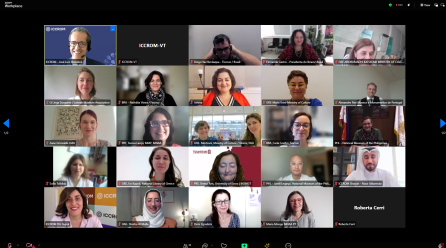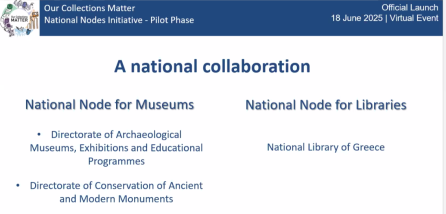On 18 June 2025, ICCROM officially launched the pilot phase of its National Nodes under the Our Collections Matter (OCM) initiative during a virtual event, marking a major milestone in the global effort to strengthen the integration of heritage collections and collections-based work into sustainable development strategies.
The event brought together high-level representatives and cultural leaders from six ICCROM Member States – Latvia, Brazil, Greece, the Philippines, Portugal, and the United Arab Emirates – for the launch of National Nodes, which are national-level coordination mechanisms. The purpose of the Nodes is to strengthen the contribution of museums, libraries, archives, and other collections-based institutions to achieving the Sustainable Development Goals (SDGs).
"With just five years remaining to meet the 2030 Sustainable Development Goals, we face a critical moment. The need for bold, innovative, and scalable solutions has never been greater. Integrating cultural heritage into national sustainability frameworks can drive real progress — from education and climate action to economic resilience and social cohesion,” stated the ICCROM Director-General in the opening remarks. “Heritage collections are not passive repositories. They are dynamic assets — capable of sparking education, scientific discovery, intercultural dialogue, creative economies, sustainable tourism, and social wellbeing."
Since its launch in 2020, the OCM initiative has been empowering cultural institutions worldwide to align their work with the SDGs through its Tools, Training, and Transformation (3T) framework. The OCM Toolkit offers hundreds of open-access resources drawn from the heritage sector and beyond, while the OCM self-assessment tool provides collections-based institutions with a snapshot of how they are currently contributing to the SDGs, and where there is potential to enhance this contribution. Together with the OCM field projects and other training opportunities, ICCROM is strengthening the capacity of heritage institutions to become active agents of sustainable development.
The establishment of National Nodes marks the beginning of a new phase—one driven by localized leadership. Each participating country designated senior cultural representatives and institutional focal points who will work together to coordinate capacity-building, strengthen cross-sector collaboration, and enhance the visibility of heritage in national development planning and reporting. In particular, the Nodes aim to support the inclusion of culture in Voluntary National Reviews (VNRs) submitted to the United Nations.
This launch also signals the start of a three-year pilot phase, during which ICCROM and its partners will refine the National Node model, deepen partnerships, and further demonstrate the vital contributions of heritage collections to sustainable, resilient societies.


